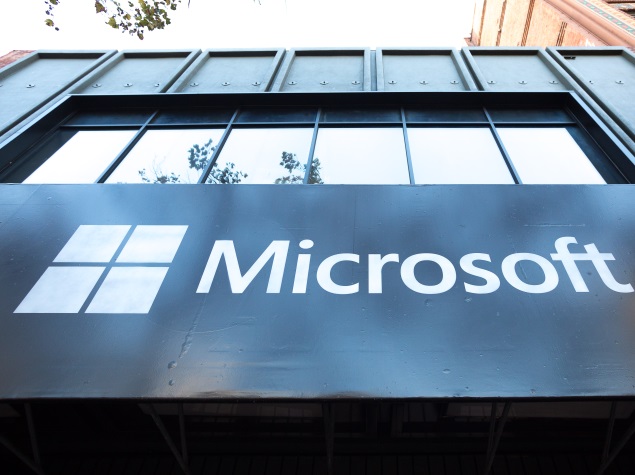- Home
- Mobiles
- Mobiles News
- Microsoft to Invest in Custom Android ROM Maker Cyanogen: Report
Microsoft to Invest in Custom Android ROM Maker Cyanogen: Report

Wall Street Journal citing people familiar with the matter reports that the Redmond-based company is planning to be a minority investor in a $70 million (approximately Rs. 432 crore) round of equity financing that is likely to see Cyanogen being valued in the "high hundreds of millions".
One of the people said that Cyanogen's financing round might see more strategic investors that have in the past shown interest in the company. Unfortunately, the report does not reveal names of any other "potential investors" likely to take part in financing. Both Cyanogen and Microsoft spokespersons declined to comment on the matter. WSJ speculates Microsoft's reason for investing in Cyanogen was to use the company's custom ROMs as points to distribute its own apps and services without being discriminated by Google.
Previous reports tipped that Cyanogen's CyanogenMod, a popular forked version of Google's Android operating system, was reportedly being eyed by several major companies including Amazon, Samsung and Yahoo, apart from Microsoft for a partnership or acquisition.
WSJ also notes that while Cyanogen has just 80 employees, it claims to have "a volunteer army" of over 9,000 software developers helping push forward the custom Android ROM. At a recent conference, where Cuanogen CEO Kirt McMaster was quoted to say "We're attempting to take Android away from Google," the outspoken CEO also claimed that more than 50 million people use CyanogenMod or other Cyanogen versions. At the same event, McMaster said that within 3 to 5 years, Cyanogen's offering would no longer be a derivative of Google's, and that its own app store would be in place within 18 months to further reduce reliance. This OS built out of Android but not relying on Google may see adoption by several major companies, including Microsoft.
Google, despite boasting about the 'openness' of its Android operating system, has been in under questions about its strict norms mandated for Android-device OEMs. A confidential document leaked last year had indicated that Google wanted more control over Android by preloading more of its apps on Android devices built by OEM partners.
Custom or forked Android builds have been gaining popularity globally, especially in China, and Strategy Analytics (via WSJ) says that 37 percent of the Android shipments globally in Q3 2014 were of forked operating systems. Cyanogen itself has enjoyed some success on this front, and apart from delivering custom CM builds for Oppo and OnePlus, recently tied up with Micromax for its Yu series of smartphones, starting with the Yureka.
Several forked Android systems do not support Google Play services, and most notably, do not have access to the more than a million apps strong Google Play store. Amazon till date has been the only company able to create its own app store for Android that has enjoyed some success and adoption - BlackBerry also offers access to the same Amazon Appstore for Android in BB10 OS. Microsoft's Nokia X software platform however, with its reliance on third-party app stores, did not fare so well.
Google's Android OS has been dominating the global smartphone segment and a recent report found that last year over 1 billion Android devices were shipped globally for the first time. It also added that Android accounted for 81 percent of all smartphones shipped last year which was followed by Apple with 15 percent global smartphone OS market share and Microsoft with 3 percent at third.
Considering that Microsoft had a small market share of the overall smartphone segment worldwide, we can expect the company to follow "unconventional steps" overturn its fortune and leveraging the Android ecosystem (like it has tried with the Nokia X lineup) appears to be a feasible move if following Amazon's example.
Catch the latest from the Consumer Electronics Show on Gadgets 360, at our CES 2026 hub.
Related Stories
- Samsung Galaxy Unpacked 2025
- ChatGPT
- Redmi Note 14 Pro+
- iPhone 16
- Apple Vision Pro
- Oneplus 12
- OnePlus Nord CE 3 Lite 5G
- iPhone 13
- Xiaomi 14 Pro
- Oppo Find N3
- Tecno Spark Go (2023)
- Realme V30
- Best Phones Under 25000
- Samsung Galaxy S24 Series
- Cryptocurrency
- iQoo 12
- Samsung Galaxy S24 Ultra
- Giottus
- Samsung Galaxy Z Flip 5
- Apple 'Scary Fast'
- Housefull 5
- GoPro Hero 12 Black Review
- Invincible Season 2
- JioGlass
- HD Ready TV
- Laptop Under 50000
- Smartwatch Under 10000
- Latest Mobile Phones
- Compare Phones
- OPPO Reno 15 Pro Max
- Honor Win RT
- Honor Win
- Xiaomi 17 Ultra Leica Edition
- Xiaomi 17 Ultra
- Huawei Nova 15
- Huawei Nova 15 Pro
- Huawei Nova 15 Ultra
- Asus ProArt P16
- MacBook Pro 14-inch (M5, 2025)
- OPPO Pad Air 5
- Huawei MatePad 11.5 (2026)
- Xiaomi Watch 5
- Huawei Watch 10th Anniversary Edition
- Acerpure Nitro Z Series 100-inch QLED TV
- Samsung 43 Inch LED Ultra HD (4K) Smart TV (UA43UE81AFULXL)
- Asus ROG Ally
- Nintendo Switch Lite
- Haier 1.6 Ton 5 Star Inverter Split AC (HSU19G-MZAID5BN-INV)
- Haier 1.6 Ton 5 Star Inverter Split AC (HSU19G-MZAIM5BN-INV)

















